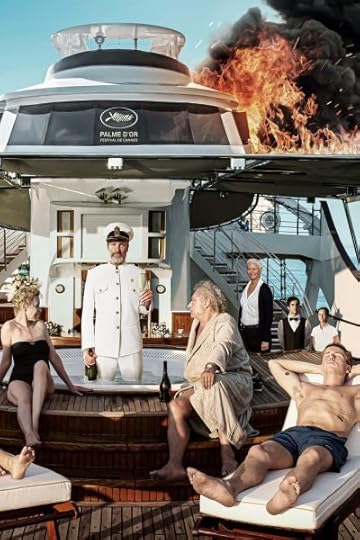In praise of bounders & cads
In praise of bounders & cads
Thanks to shows such as Succession, Rivals, The White Lotus and Sirens there’s never a supply shortage of at shows involving rich and privileged people behaving badly. It’s become a streaming genre which offers up the possibility of drama, disaster, satire, and humour in one easily consumed package.
Movies are also providing ‘wealth critique’ with suspense comedies such as Knives Out , Triangle of Sadness and the The Menu. I greatly enjoyed Triangle of Sadness, primarily because of the presence of Woody Harrelson who plays the cynical captain of the doomed luxury cruiser. Champagne glass in hand, Capatain Smith is forced to interact with the mega rich passengers who are astonishingly out of touch with reality.
By the time we meet Captain Thomas Smith he’s given up all pretence of being in command of his ship. To be sure the captain has quite a few cad & bounder qualities but he’s also a humorous man possessing deep intelligence and insight. Captain Smith is an alcoholic who openly refers to himself as a communist. His witty arguments about Marx and capitalism with his obscenely wealthy passengers provides comedy in the movie. And his drunken rant with Dimitry, a Russian capitalist is wide ranging and leads an unexpected disaster.
I was disappointed when Harrelson disappeared from the cast early in the piece, leaving behind a bunch of rich and privileged characters. But it would be a spoiler if I detailed the plot any further.
Bounder and Cad are descriptors that were popular in the 19th and early 20th centuries. A bounder was a man who behaves badly or immorally especially towards women. Whereas a cad had more in common with a scoundrel or an ill-bred man who demonstrates ungentlemanly behaviour.
In the biography aptly titled, The Scandalous Freddie McEvoy by Frank Walter, we first meet McEvoy when he was an Olympic bobsledding champion. Despite being Australian, he represented Britain in the 1936 Winter Olympics in Germany. McEvoy later dedicated himself to racing cars, marrying heiresses, smuggling and doing dodgy business deals. He lived by his wits, charm and sharp intelligence.
McEvoy became a close friend of Errol Flynn and they partied hard in Hollywood. Most folk loved McEvoy even though he was publicly known as a scoundrel, rake, fighter and cad. His former wives and lovers remained loyal to him long after he’d moved on. Several of them spoke longingly of his outstanding sexual skills and his ability to charm, persuade and seduce.
Being tall, strapping and handsome McEvoy had no trouble attracting women of financial means. He loved the high life and was willing to do pretty much anything – including law breaking – to enjoy living in the fast lane.
Freddie McEvoy lived by his own amoral standards but many men and women remained friends with him despite his wild wicked ways. He appealed to both sexes and knew how to manipulate most social situations to suit himself.
McEvoy was suspected of being a double agent and died a brutal death in mysterious circumstances. Errol Flynn was distraught at losing his friend and spoke movingly of McEvoy’s better qualities and his loyalty and courage.
In the final chapter of McEvoy’s biography, author Frank Walter sums him up in negative terms as a ‘rogue, bounder, cad, rake, grafter, scoundrel, anti-hero, opportunist, rascal, rapscallion, lothario, gigolo, smuggler, black marketeer, brawler, predator, philanderer, reprobate.’
But Walter also describes McEvoy as ‘witty, charming, amiable, debonair, daring, dashing, swashbuckling, carefree, fearless, seductive, fascinating, devil-may-care, considerate, courageous, polite, impeccably mannered, versatile, gallant, attractive, libertarian, likeable, loyal.’
Frankly, I think McEvoy would have been fabulous company. And those who knew him well –including the many women he ruthlessly fleeced financially – willingly acknowledged his good points and seemed to think their money had been well spent. McEvoy’s women are depicted in the round and we get to know them and appreciate the way their minds worked. They were not just a bunch of shamelessly rich women living the sort of life that is often represented in books and movies as rich folk behaving badly.
I really enjoyed McEvoy’s biography. It was extremely well researched, without being tediously scholarly, and the author was engaging even when discussing European politics. Frank Walker’s sense of humour is embedded in his writing.
Errol Flynn was devastated when his best friend died in the yacht wreck near Morrocco. As Flynn told a newspaper journalist, ‘Freddie was one of the great livers of life. He lived it the way he saw it. He didn’t give a hoot. And the people who knew him, knew that he was a brave and generous spirit. He went out the right way when his time came – with courage.’
photo above: Woody Harrelson and cast in the movie, Triangle of Sadness (2022)
The post In praise of bounders & cads appeared first on Lesley Truffle - Writer.




